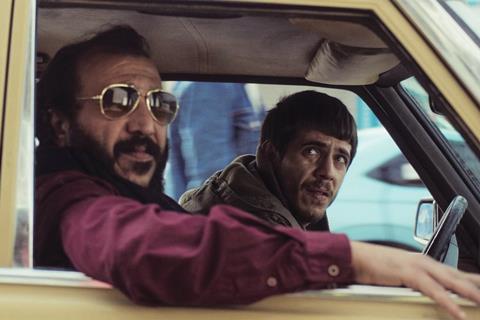Latest film from the Nasser brothers looks at everyday life in Gaza City in the 2010s

Dirs. Arab Nasser, Tarzan Nasser. France/Palestine/Germany/Portugal/Jordan//Qatar 2025. 90mins
While the world sees daily images of Gaza under siege, there is a notable dearth of pictures of everyday Gazan life – and of the Gazan imagination. Gaza-born film-making brothers Arab and Tarzan Nasser are prominent exponents of the latter, and Once Upon A Time In Gaza is the latest of their fictions directly emerging from their culture and experience, following 2015’s Dégradé and 2020’s wry, romantically-toned Gaza Mon Amour. This much harder-edged drama deploys a variety of movie modes – revenge thriller, action movie, comedy – to speak indirectly but resonantly about Gaza’s current plight, but also to give a historical sense of recent life and struggles in Gaza City.
The reality of Gaza’s current situation hovers over the entire film
Like Dégradé, which premiered in Critics Week and Gaza Mon Amour, which was Palestine’s submission to the 2021 Academy awards, this taut, succinct film should win widespread attention following its bow in Un Certain Regard. MAD Solutions will release in the MENA region while Dulac Distribution has French distribution rights.
The first note specifically addressing the present is an opening extract from Donald Trump’s bizarre, ominous speculation that Gaza could become “the Riviera of the Middle East”. But the action begins in 2007, in a rundown city markedly bereft of Riviera glamour and already under blockade by Israel. Majd Eid plays Osama, a burly falafel shop owner who has a sideline in selling illicitly obtained painkillers. His reluctant assistant is a slight, nervous young man named Yahya (Nader Abd Alhay), who works in his shop. Osama is under pressure from crooked cop Abou Sami (Ramzi Maqdisi) to work as his informant; when he holds out, things come to a brutal head.
Here the action skips two years, and shifts into a very different mode, as a clearly traumatised Yahya is approached by a film director (Is’haq Elias). Yahya, it turns out, resembles the militant whose funeral we glimpsed at the start, and he is now enlisted to play him in an action movie sponsored by Gaza’s Ministry of Culture. Cautiously accepting the role, Yahya finds himself on a somewhat farcical shoot on which real weapons, including loaded guns, are used because there is no budget for special effects. The Nasser brothers play the film-within-a-film somewhat for laughs, until Abou Sami, who has something to hide, turns up on set to make sure it stays hidden.
This is an altogether self-reflexive film, commenting on the difference between filmed and real imagery, but also making it clear that fiction cinema can be a form of resistance. There are some heightened effects, notably a trailer for the movie that is yet to be made, but much of the film works in a muted, realist, atmospherically dense thriller mode.
The reality of Gaza’s current situation hovers over the entire film, with glimpsed headlines – notably in newspapers used to wrap falafel pittas – referring to mounting pressures brought by the Netanyahu government. Intriguingly, though, the film largely chooses to represent conflict with Israel indirectly, in the form of the Palestinian movie actors playing IDF soldiers, who at one point are taken for real by a confused onlooker.
Spare construction includes a few tricks, notably the midpoint jump in time and direction, and a brief flashback at the end, showing how Yahya and Osama first met – a rare scene shot in broad daylight, showing (relatively) brighter days before desperate times set in.
Abrupt dramatic pacing means that the final confrontation on the film shoot somewhat lacks momentum. But the tight focus on three characters pays off very effectively, not least with the quietly charismatic Nader Abd Alhay morphing from bashful sidekick to haggard outcast to unbowed hero – even if it’s in in the guise of someone else. Majd Eid is suitably snaky as the devious cop, while Eid gives the film’s first half a distinctive focus as an indomitable heavyweight anti-hero.
Gaza Mon Amour DoP Christophe Graillot returns to lay on some moody nocturnal tones and to rustle up a mix of visual textures, including various pastiche styles, while Amine Bouhafa’s score mixes Middle East with a hint of Morricone, not least in some plangent trumpet laments.
Production company: Les Films du Tambour
International sales: The Party Film Sales, sales@thepartysales.com
Producers: Rani Massalha, Marie Legrand, Muriel Merlin, Rashid Abdelhamid
Screenplay: Arab Nasser, Tarzan Nasser, Amer Nasser, Marie Legrand
Cinematography: Christophe Graillot
Production design: Arab Nasser, Tarzan Nasser
Editor: Sophie Reine
Music: Amine Bouhafa
Main cast: Nader Abd Alhay, Ramzi Maqdisi, Majd Eid, Is’haq Elias

























No comments yet